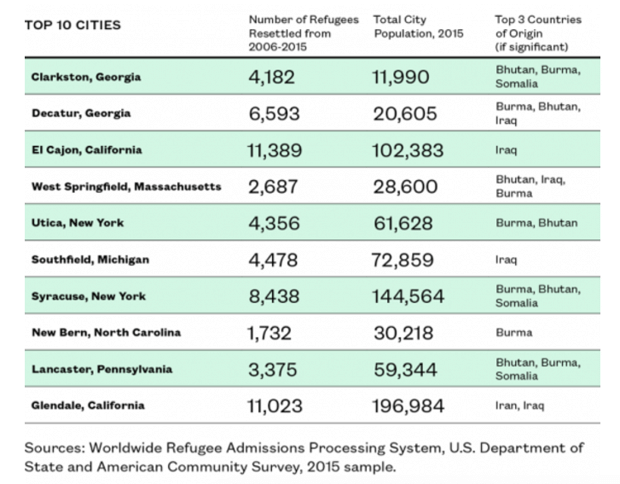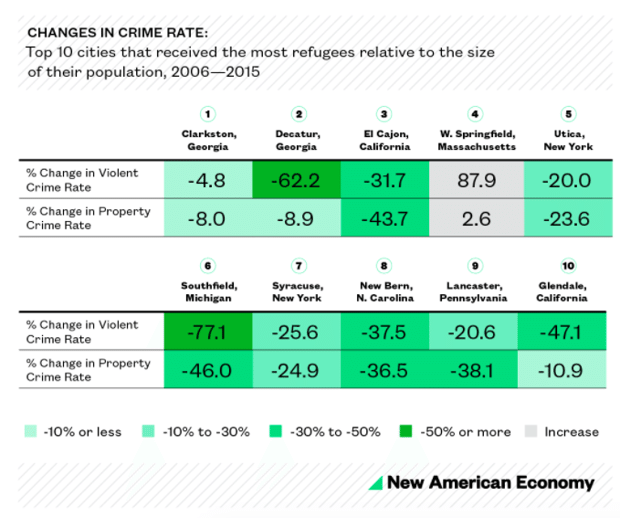Connecting state and local government leaders
In nine out of the ten cities that accepted the largest number of refugees, crime went down—sometimes dramatically.
At a meeting with Canadian Prime Minister Justin Trudeau Monday, President Donald Trump defended his executive orders on immigration, including the ban on refugees and travelers from seven Muslim majority countries. Via UPI:
“We are getting such praise for our stance, and it’s a stance of common sense.”
Trump has often claimed that suspending refugee resettlement is imperative for the safety and security of the country. He and his supporters often cite terrorists attacks in San Bernardino and Orlando to support their case, even though neither involved refugees. Trump advisor Kellyanne Conway, meanwhile, famously conjured the fictitious “Bowling Green Massacre” to prove that refugees represented a threat.
But there is a substantial body of fact-based evidence on the links between refugee populations and crime in U.S. cities. The latest addition to this field of study comes from an analysis by the Partnership for a New American Economy, a consortium of bipartisan political and business leaders for immigration reform.
Using resettlement data from the U.S. Department of State, researchers drew up a list of the 10 U.S. cities that received the most refugees relative to their size in the last 10 years. Then they examined the crime rates in these communities using FBI datasets. Here are the ten cities that made the cut:

Their analysis revealed that after refugees moved in, crime usually went down. Nine out of ten cities on the list saw their property and violent crime levels decline—some by drastic amounts. In Southfield, Michigan (in bright green), for example, violent crime dropped by 77 percent between 2006 and 2015. Decatur, Georgia (in bright green), which lies outside Atlanta, saw a 62.2 percent decrease between 2007 and 2015. The lone exception was West Springfield, Massachusetts (in grey), which experienced a significant rise in crime during this time. But the town was a hotbed of opioid drug-related crime even before the refugee resettlement happened.

FBI crime data is reported by local police and not perfect. That’s why for a couple of cities, the changes in crime reflect a shorter period of time. And, of course, a trend in ten relatively small cities doesn’t necessarily reflect what’s happening nationwide in larger cities that are taking in refugees. But the general conclusion—that there’s a strong correlation between immigration and lower crime—is well-supported by research.
If not local crime, what about the threat of terrorism? Over at the Lawfare blog, Nora Ellington, a Harvard Law student who previously worked as an analyst at the FBI’s Counterterrorism Division, took a deep dive into the data. Since January 1, 2015, the FBI arrested four refugees on terrorism-related charges, two of whom were from countries on Trump’s list. Omar Faraj Saeed Al Hardan came to the U.S. from Iraq in 2009 and was charged with “providing material support” to the Islamic State. Iraqi-born Aws Mohammed Younis Al-Jayab came from Syria in 2012. Per the Justice Department, he went back there for a few months in 2013 and 2014 to fight alongside terrorist groups.
For some context on those two arrests: Around 85,000 refugees came to the country in 2016; 46 percent were Muslim. In fiscal year 2015, the U.S. took in over 69,000 refugees. Ellington concludes:
Absolutely nothing in the large body of data we have about real terrorist plots in the United States remotely supports either a focus on barring refugees or a focus on these particular seven countries.
Nothing.
This bears out even if we look further back. Alex Nowrasteh of the Cato Institute found that between 1975 and 2015, not a single person in the U.S. was killed by a refugee from Trump's list of seven countries.
The days following Trump’s executive order were chaotic: People in precarious conditions around the world, who had already gone through years of rigorous vetting, were immediately blocked from boarding their flights. Those who had already arrived in the U.S. were met by a wall of Customs and Border Protection agents. Now, even though courts have temporarily stayed the order, the fate of thousands of refugees in the U.S. hoping to escape the persecution in their own countries hangs in balance.
Of course, the U.S.—like any other country—has the right to restrict its immigration policy to promote its national interest. But choking the refugee resettlement program, experts have argued, may be doing just the opposite.
Tanvi Misra is a staff writer for CityLab, where this article was originally published.

NEXT STORY: Needle-Exchange Case Heads to the Massachusetts Supreme Judicial Court



